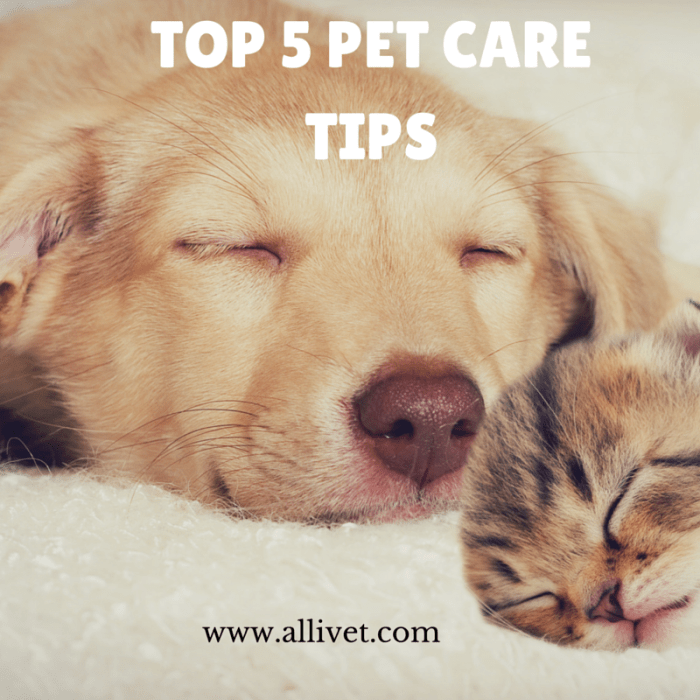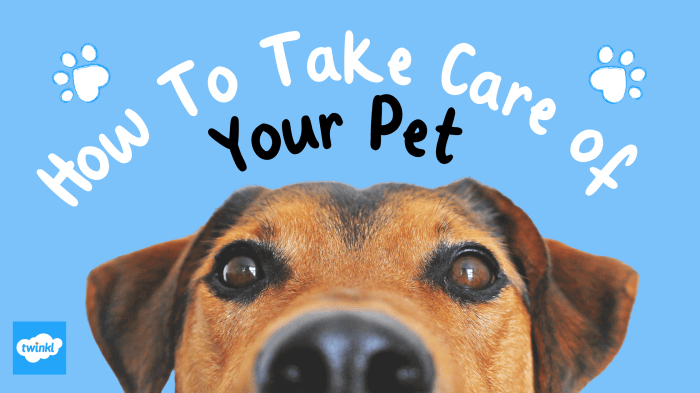Pet care tips take the spotlight in this guide, offering a cool and informative look into the world of keeping your pets in top shape. From nutrition to exercise, grooming to safety, it’s all covered here with a fresh twist.
Importance of Pet Care
Taking care of your pet is crucial for their overall health and well-being. Just like humans, pets require regular care to thrive and lead a happy life. Providing proper care not only ensures their physical health but also contributes to their emotional and mental well-being.
Benefits of Proper Care
- Regular grooming helps maintain a clean and healthy coat, preventing skin issues and matting.
- Proper nutrition and feeding schedules support optimal growth and development, ensuring your pet stays healthy and strong.
- Regular exercise and playtime are essential for your pet’s physical fitness and mental stimulation.
- Routine veterinary check-ups and vaccinations help prevent diseases and detect any health issues early on.
- Creating a safe and comfortable environment at home reduces stress and anxiety in pets, promoting a sense of security and well-being.
Bond Between Pets and Owners
Providing regular care routines not only benefits the pet but also strengthens the bond between pets and their owners. Spending quality time grooming, feeding, and playing with your pet helps build trust and mutual affection. The consistent care and attention you provide create a sense of security and attachment, enhancing the bond and creating a lasting relationship based on love and companionship.
Nutrition and Diet

When it comes to pet care, nutrition and diet play a crucial role in ensuring the health and well-being of our furry friends. Providing the right food is essential for their growth, energy levels, and overall health.
Choosing the Right Food
- Consider the age, size, and breed of your pet when selecting their food.
- Consult with your veterinarian to determine if your pet has any specific dietary requirements.
- Look for pet food that is AAFCO approved to ensure it meets nutritional standards.
Importance of a Balanced Diet
- A balanced diet is essential for providing the necessary nutrients for your pet’s overall health.
- Proteins, carbohydrates, fats, vitamins, and minerals are all crucial components of a balanced diet.
- Ensure your pet has access to fresh water at all times to support digestion and hydration.
Foods to Avoid
- Chocolate, grapes, raisins, and onions are toxic to pets and should never be fed to them.
- Alcohol, caffeine, and xylitol (found in sugar-free gum) can also be harmful to pets.
- Raw meat, bones, and fatty foods can pose a choking hazard or cause digestive issues for pets.
Grooming and Hygiene
Regular grooming is essential for the overall health and well-being of pets. It not only keeps them looking clean and tidy but also helps prevent health issues such as skin infections and matting of fur. Proper hygiene practices are equally important in maintaining a pet’s health and happiness.
Grooming Tips for Different Types of Pets
Proper grooming techniques vary depending on the type of pet you have. Here are some general grooming tips for different types of pets:
- Dogs: Regularly brush your dog’s coat to prevent matting and remove loose fur. Bathe them as needed, using pet-safe shampoo. Trim their nails regularly to prevent overgrowth.
- Cats: Brush your cat’s coat to prevent hairballs and matting. Use a damp cloth to wipe their fur for spot cleaning. Trim their nails to avoid scratching furniture or people.
- Small Animals (rabbits, guinea pigs): Gently brush their fur to prevent matting and remove loose hair. Provide regular dust baths for animals like chinchillas. Trim their nails to prevent them from getting too long.
- Birds: Regularly bathe your bird to keep their feathers clean and healthy. Clean their cage and perches regularly to prevent the buildup of bacteria. Trim their nails and wings as needed.
Importance of Proper Hygiene Practices
Proper hygiene practices are crucial in preventing health issues in pets, such as skin infections, parasites, and dental problems. Here are some hygiene practices to keep in mind:
- Regularly clean your pet’s living area, including bedding, toys, and food/water bowls.
- Keep your pet’s fur clean and free of debris by regularly grooming them.
- Brush your pet’s teeth regularly or provide dental chews to prevent dental issues.
- Check your pet for fleas and ticks regularly, and use preventative treatments as needed.
- Regularly trim your pet’s nails to prevent overgrowth and discomfort.
Exercise and Playtime
Regular exercise and playtime are crucial for the overall well-being of our beloved pets. Not only does it help keep them physically fit, but it also plays a significant role in maintaining their mental health and happiness.
Importance of Exercise
Engaging in regular physical activities is essential for pets to maintain a healthy weight, improve cardiovascular health, and boost their immune system. Exercise also helps in reducing stress and anxiety in pets, promoting better behavior and reducing the risk of depression.
- Take your dog for daily walks or runs to keep them active and maintain a healthy weight. Consider exploring new trails or parks to make the experience more exciting for them.
- Engage in interactive play sessions with your cat using toys like feathers, laser pointers, or interactive puzzles to stimulate their mind and keep them physically active.
- Set up obstacle courses or agility training for your pets to provide mental stimulation and improve their coordination and agility.
Prevention of Health Problems, Pet care tips
Regular exercise can help in preventing obesity, which is a common issue among pets that can lead to various health problems such as diabetes, joint pain, and heart disease. By incorporating exercise into their daily routine, you can help your pets maintain a healthy weight and reduce the risk of developing these health issues.
- Monitor your pet’s food intake and ensure they are receiving a balanced diet to complement their exercise routine and maintain optimal health.
- Consult with your veterinarian to create a customized exercise plan based on your pet’s age, breed, and overall health condition for maximum benefits.
- Stay consistent with your pet’s exercise routine and make it a fun and enjoyable experience for them to look forward to every day.
Health Care and Veterinary Visits

Regular health check-ups are crucial for pets to ensure they are in good health and catch any potential issues early on. Just like humans, pets need preventive care to maintain their well-being and quality of life.
Importance of Regular Health Check-ups
Regular veterinary visits help monitor your pet’s overall health and detect any underlying conditions before they become serious. During these check-ups, vets can provide necessary vaccinations, perform tests, and offer advice on nutrition and exercise.
Tips for Keeping Track of Vaccinations and Medications
It’s essential to maintain a record of your pet’s vaccinations and medications to ensure they are up to date. Keep a pet health journal or use a reminder app to track appointments, medications, and any changes in your pet’s health. Consult your vet for guidance on the vaccination schedule and proper administration of medications.
Common Health Issues in Pets and When to Seek Veterinary Care
Pets can experience various health issues, including dental problems, skin allergies, obesity, and joint pain. Watch out for symptoms such as lethargy, loss of appetite, vomiting, or unusual behavior. If you notice any concerning signs, it’s crucial to seek veterinary care promptly to prevent complications and ensure your pet’s well-being.
Training and Behavior: Pet Care Tips
Training your pet is essential for their well-being and your peace of mind. By teaching them obedience and good behavior, you can ensure a harmonious relationship with your furry friend.
Tips for Effective Training
- Start early: Begin training your pet as soon as you bring them home to establish good habits from the start.
- Use positive reinforcement: Reward your pet with treats, praise, or playtime when they exhibit the desired behavior.
- Be consistent: Set clear rules and boundaries for your pet and enforce them consistently.
- Practice patience: Training takes time and repetition, so be patient with your pet as they learn.
Dealing with Common Behavior Problems
- Excessive barking: Address the root cause of barking, such as boredom or anxiety, and provide appropriate outlets for your pet’s energy.
- Aggression: Consult a professional trainer or behaviorist to address aggressive behavior in your pet and implement a behavior modification plan.
- Separation anxiety: Gradually desensitize your pet to being alone by practicing short departures and providing comfort items while you’re away.
- Jumping on people: Teach your pet an alternative behavior, such as sitting, and reward them for greeting guests calmly.
Safety and Pet-proofing
Creating a safe environment for your pets is crucial to their well-being. By pet-proofing your home, you can prevent accidents and injuries, keeping your furry friends out of harm’s way. Here are some tips to help you pet-proof your home:
Identify Potential Hazards
- Keep toxic plants out of reach, such as lilies, poinsettias, and philodendrons.
- Secure cabinets and trash cans to prevent pets from accessing harmful substances like cleaning products or food wrappers.
- Hide electrical cords to avoid chewing and potential electric shocks.
Secure Your Living Space
- Install baby gates to block off areas that are unsafe for pets, like staircases or rooms with delicate items.
- Keep small objects off the floor to prevent choking hazards.
- Consider using pet gates to create safe zones for your pets when you’re not around to supervise.
Common Household Items to Avoid
- Avoid feeding pets chocolate, grapes, onions, garlic, and xylitol, as these can be toxic to them.
- Store medications, vitamins, and supplements in a secure location to prevent accidental ingestion.
- Be cautious with string, yarn, and rubber bands, as they can be choking hazards or cause intestinal blockages if swallowed.
Seasonal Care Tips
When it comes to caring for your pets, it’s important to consider how the changing seasons can affect them. From extreme heat in the summer to freezing temperatures in the winter, pets need special care to stay safe and comfortable throughout the year.
Summer Care Tips
- Make sure your pets have access to plenty of fresh water to stay hydrated in the hot weather.
- Avoid walking your pets on hot pavement to prevent burns on their paw pads.
- Provide shade and a cool place for your pets to rest during the hottest parts of the day.
- Never leave your pets in a parked car, as temperatures can quickly rise to dangerous levels.
Winter Care Tips
- Keep your pets indoors during extreme cold weather to prevent frostbite and hypothermia.
- Dry off your pets after they come in from the snow to prevent ice from forming on their fur and skin.
- Dress your pets in warm sweaters or jackets if they are going outside in cold weather.
- Check your pets’ paws for signs of irritation from ice-melting chemicals and use pet-safe alternatives.

